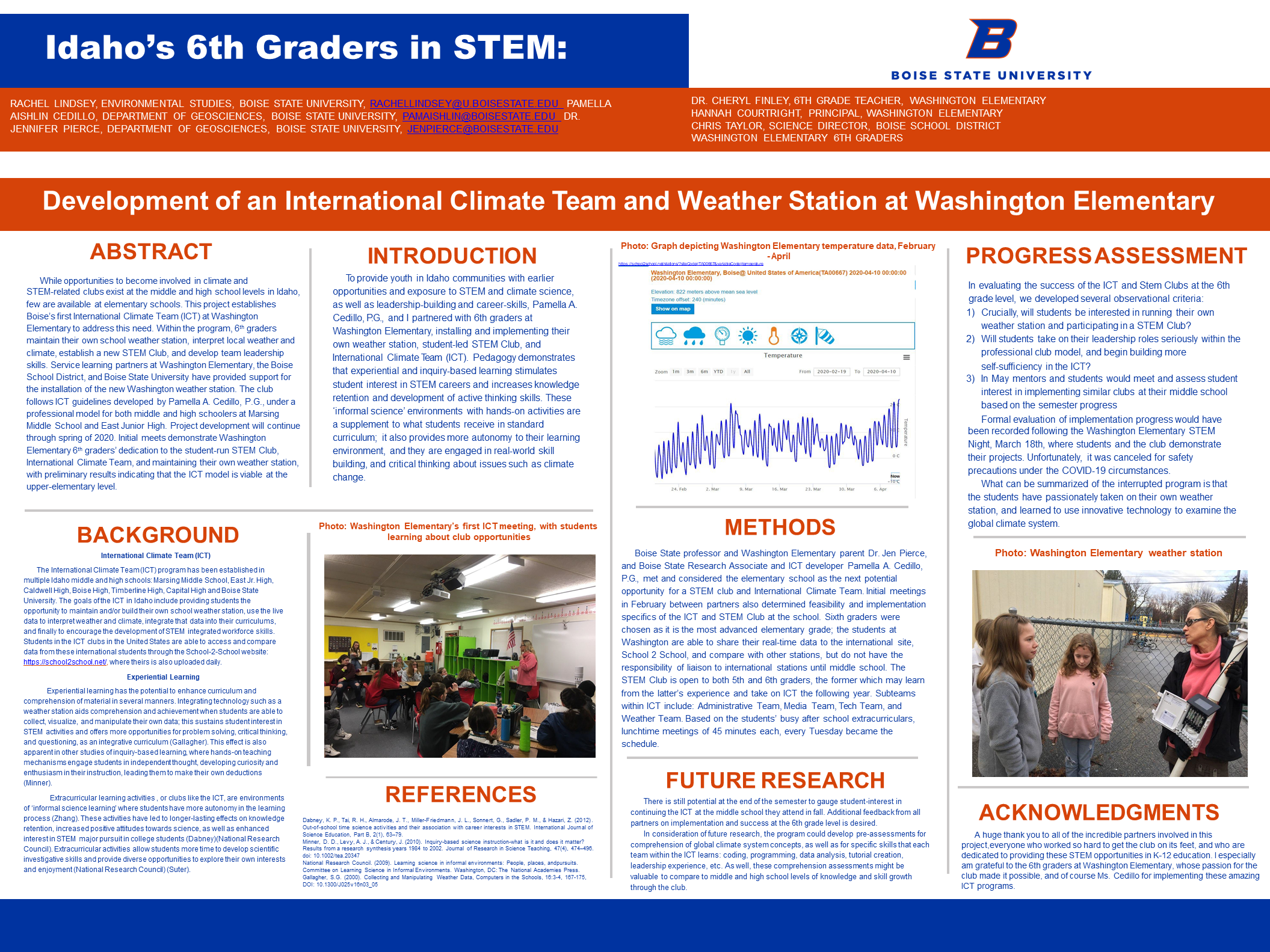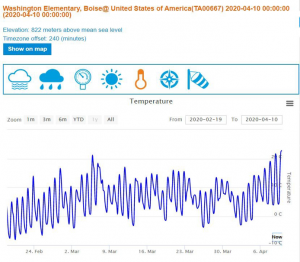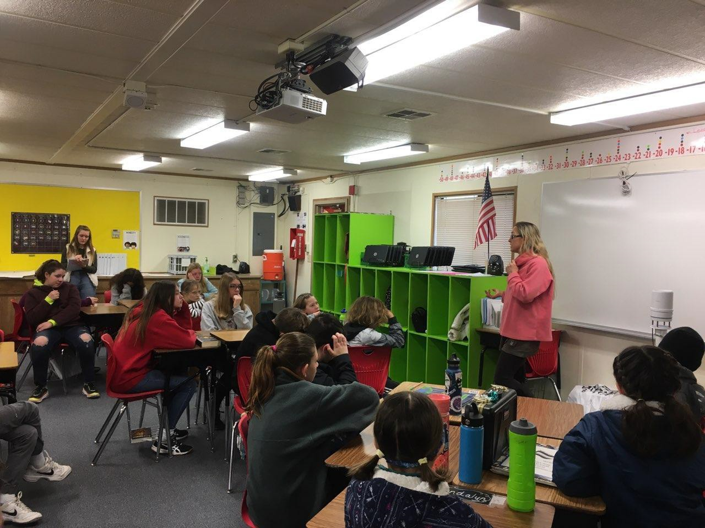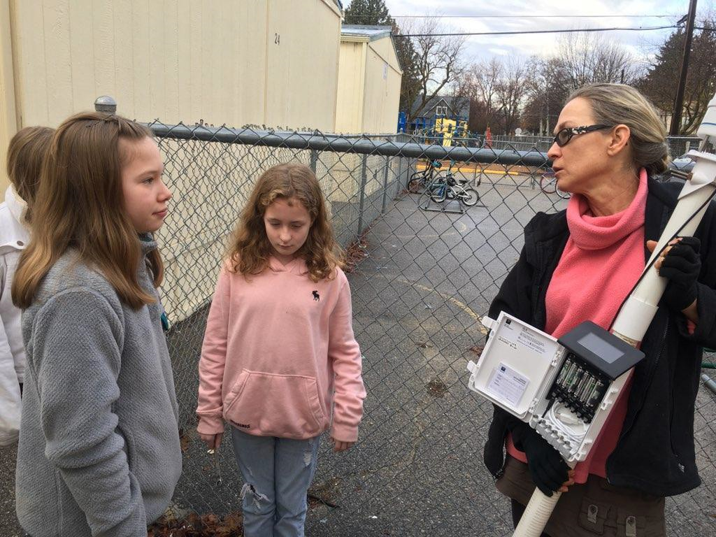Development of an International Climate Team and Weather Station at Washington Elementary
Rachel Anne Lindsey, Pamella A. Cedillo, Dr. Jen Pierce, Dr. Cheryl Finley, Hannah Courtright, Chris Taylor

Abstract
While opportunities to become involved in climate and STEM-related clubs exist at the middle and high school levels in Idaho, few are available at elementary schools. This project establishes Boise’s first International Climate Team (ICT) at Washington Elementary to address this need. Within the program, 6th graders maintain their own school weather station, interpret local weather and climate, establish a new STEM Club, and develop team leadership skills. Service learning partners at Washington Elementary, the Boise School District, and Boise State University have provided support for the installation of the new Washington weather station. The club follows ICT guidelines developed by Pamella A. Cedillo, P.G., under a professional model for both middle and high schoolers at Marsing Middle School and East Junior High. Project development will continue through spring of 2020. Initial meets demonstrate Washington Elementary 6th graders’ dedication to the student-run STEM Club, International Climate Team, and maintaining their own weather station, with preliminary results indicating that the ICT model is viable at the upper-elementary level.
Introduction
To provide youth in Idaho communities with earlier opportunities and exposure to STEM and climate science, as well as leadership-building and career-skills, Pamella A. Cedillo, P.G., and I partnered with 6th graders at Washington Elementary, installing and implementing their own weather station, student-led STEM Club, and International Climate Team (ICT). Pedagogy demonstrates that experiential and inquiry-based learning stimulates student interest in STEM careers and increases knowledge retention and development of active thinking skills. These ‘informal science’ environments with hands-on activities are a supplement to what students receive in standard curriculum; it also provides more autonomy to their learning environment, and they are engaged in real-world skill building, and critical thinking about issues such as climate change.
Program Assessment

In evaluating the success of the ICT and Stem Clubs at the 6th grade level, we developed several observational criteria:
- Crucially, will students be interested in running their own weather station and participating in a STEM Club?
- Will students take on their leadership roles seriously within the professional club model, and begin building more
self-sufficiency in the ICT? - In May mentors and students would meet and assess student interest in implementing similar clubs at their middle school based on the semester progress
Formal evaluation of implementation progress would have been recorded following the Washington Elementary STEM Night, March 18th, where students and the club demonstrate their projects. Unfortunately, it was canceled for safety precautions under the COVID-19 circumstances.
What can be summarized of the interrupted program is that the students have passionately taken on their own weather station, and learned to use innovative technology to examine the global climate system.
Background

International Climate Team (ICT)
The International Climate Team (ICT) program has been established in multiple Idaho middle and high schools: Marsing Middle School, East Jr. High, Caldwell High, Boise High, Timberline High, Capital High and Boise State University. The goals of the ICT in Idaho include providing students the opportunity to maintain and/or build their own school weather station, use the live data to interpret weather and climate, integrate that data into their curriculums, and finally to encourage the development of STEM integrated workforce skills. Students in the ICT clubs in the United States are able to access and compare data from these international students through the School-2-School website, where theirs is also uploaded daily.
Experiential Learning
Experiential learning has the potential to enhance curriculum and comprehension of material in several manners. Integrating technology such as a weather station aids comprehension and achievement when students are able to collect, visualize, and manipulate their own data; this sustains student interest in STEM activities and offers more opportunities for problem solving, critical thinking, and questioning, as an integrative curriculum (Gallagher). This effect is also apparent in other studies of inquiry-based learning, where hands-on teaching mechanisms engage students in independent thought, developing curiosity and enthusiasm in their instruction, leading them to make their own deductions (Minner).
Extracurricular learning activities , or clubs like the ICT, are environments of ‘informal science learning’ where students have more autonomy in the learning process (Zhang). These activities have led to longer-lasting effects on knowledge retention, increased positive attitudes towards science, as well as enhanced interest in STEM major pursuit in college students (Dabney)(National Research Council). Extracurricular activities allow students more time to develop scientific investigative skills and provide diverse opportunities to explore their own interests and enjoyment (National Research Council) (Suter).
Methods
Boise State professor and Washington Elementary parent Dr. Jen Pierce, and Boise State Research Associate and ICT developer Pamella A. Cedillo, P.G., met and considered the elementary school as the next potential opportunity for a STEM club and International Climate Team. Initial meetings in February between partners also determined feasibility and implementation specifics of the ICT and STEM Club at the school. Sixth graders were chosen as it is the most advanced elementary grade; the students at Washington are able to share their real-time data to the international site, School 2 School, and compare with other stations, but do not have the responsibility of liaison to international stations until middle school. The STEM Club is open to both 5th and 6th graders, the former which may learn from the latter’s experience and take on ICT the following year. Subteams within ICT include: Administrative Team, Media Team, Tech Team, and Weather Team. Based on the students’ busy after school extracurriculars, lunchtime meetings of 45 minutes each, every Tuesday became the schedule.
Future Research

There is still potential at the end of the semester to gauge student-interest in continuing the ICT at the middle school they attend in fall. Additional feedback from all partners on implementation and success at the 6th grade level is desired.
In consideration of future research, the program could develop pre-assessments for comprehension of global climate system concepts, as well as for specific skills that each team within the ICT learns: coding, programming, data analysis, tutorial creation, leadership experience, etc. As well, these comprehension assessments might be valuable to compare to middle and high school levels of knowledge and skill growth through the club.
References
- Dabney, K. P., Tai, R. H., Almarode, J. T., Miller-Friedmann, J. L., Sonnert, G., Sadler, P. M., & Hazari, Z. (2012). Out-of-school time science activities and their association with career interests in STEM. International Journal of Science Education, Part B, 2(1), 63–79.
- Minner, D. D., Levy, A. J., & Century, J. (2010). Inquiry-based science instruction-what is it and does it matter? Results from a research synthesis years 1984 to 2002. Journal of Research in Science Teaching, 47(4), 474–496. doi: 10.1002/tea.20347
- National Research Council. (2009). Learning science in informal environments: People, places, andpursuits. Committee on Learning Science in Informal Environments. Washington, DC: The National Academies Press. Gallagher, S.G. (2000). Collecting and Manipulating Weather Data, Computers in the Schools, 16:3-4, 167-175, DOI: 10.1300/J025v16n03_05
Future Research
There is still potential at the end of the semester to gauge student-interest in continuing the ICT at the middle school they attend in fall. Additional feedback from all partners on implementation and success at the 6th grade level is desired.
In consideration of future research, the program could develop pre-assessments for comprehension of global climate system concepts, as well as for specific skills that each team within the ICT learns: coding, programming, data analysis, tutorial creation, leadership experience, etc. As well, these comprehension assessments might be valuable to compare to middle and high school levels of knowledge and skill growth through the club.
Acknowledgements
A huge thank you to all of the incredible partners involved in this project,everyone who worked so hard to get the club on its feet, and who are dedicated to providing these STEM opportunities in K-12 education. I especially am grateful to the 6th graders at Washington Elementary, whose passion for the club made it possible, and of course Ms. Cedillo for implementing these amazing ICT programs.
Additional Information
For questions or comments about this research, contact Rachel Anne Lindsey at rachellindsey@u.boisestate.edu.